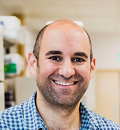Keynote Speakers
Melissa A. Haendel, PhD
Associate Professor of Medical Informatics and Clinical Epidemiology School of Medicine
Oregon Health & Science University
Melissa Haendel is the Director of the Center for Data to Health (CD2H) at Oregon Health & Science University, and the Director of Translational Data Science at Oregon State University. Her background is in both wet and dry lab translational science, with a focus over the past decade on the development of ontologies, semantic engineering technologies, and open science infrastructure programs. Dr. Haendel's vision is to weave together healthcare systems, basic science research, and patient generated data through development of data integration technologies and innovative data capture strategies. Dr. Haendel co-leads the Monarch Initiative, an international consortium dedicated to utilizing model organism genotype-phenotype data, deep phenotyping, and graph-based integration techniques to improve rare disease diagnosis. She also coleads the NCATS Data Translator, which aims to integrate hundreds of data resources for mechanism and drug discovery. The CD2H is tasked with coordinating informatics across 59 Clinical and Translational Science Award Institutes, and is focused on implementation of cloud and information architecture, clinical data model interoperability, and precision-medicine focused terminology development. Dr. Haendel is the co-lead for the GA4GH Clinical and Phenotypic workstream, where she supports cross-disciplinary international teams, development of standards for clinical genetics, and improving access to data across the world.
Born reusable: data in harmony to realize the dream of AI
Addressing complex challenges in disease discovery and diagnosis requires weaving together healthcare systems, basic science research, and patient-generated data. Although we learn different things from these different data sources, building a coherent holistic view of this data landscape is non-trivial. Often in the aggregation process, many of the original connections within the data are lost. Moreover, it is difficult to make new (inferred) connections without a common conceptual model. This common model is made possible by novel data integration technologies and innovative data capture strategies that leverage ontologies. This talk will focus on the use of ontologies to support the development of knowledge graphs that span disciplinary boundaries. Dr. Haendel will also discuss strategies for how to reconcile different terminologies and examples of harmonized semantic structures and their use in aiding mechanism discovery and rare disease diagnosis.

Solomon Ofori-Acquah, PhD
Dean, School of Biomedical and Allied Health Sciences
University of Ghana
Professor Ofori-Acquah was appointed Dean of the School of Biomedical and Allied HealthSciences, University of Ghana in January 2017, and Associate Professor of Medicine andHuman Genetics, University of Pittsburgh, USA in 2013. He is Director of the West AfricanGenetic Medicine Centre (WAGMC), and Director of the Sickle Cell Disease Genomics Networkof Africa (SickleGenAfrica). Professor Ofori-Acquah was born in Cape Coast. He attendedAdisadel College from 1977-1984 where he was the Cadet Corps Sargent Major. He migrated toEngland in 1985 to pursue higher education; he obtained a Higher National Certificate inHematology and Blood Transfusion in 1989 and Part 1 Fellowship of the Institute of BiomedicalSciences in 1990, MSc in Bio-molecular Organization from Birkbeck College, University ofLondon in 1992, and PhD in Molecular Genetics, King’s College London, University of London in2000. He conducted postdoctoral studies on missense RNA therapy for sickle cell disease(SCD) at the University of South Alabama; he was Scholar of the Comprehensive Sickle CellCenter and Assistant Professor of Cell Biology and Neuroscience at the University of SouthAlabama. He joined Emory University as Assistant Professor of Pediatrics in 2007 and theUniversity of Pittsburgh in 2013 as Tenured Associate Professor of Medicine.
Professor Ofori-Acquah’s research is focused on pathogenesis, genomics and innovativetherapy in SCD. His seminal publication in the Journal of Clinical Investigation in 2013 definedheme as a danger molecule involved in sterile inflammation in SCD and established the firstmouse model of the Acute Chest Syndrome. His research has continuously been funded by theNIH and other funding agencies since 2004. He has authored over 60 research papers, reviewsand book chapters, and mentored over 30 Junior Scientists, Physicians and Students. He is anExpert NIH Reviewer with service on multiple committees focused on Respiratory Biology,Hematology and Genomics. He was Chair of the Laboratory Sub-Committee of the GhanaNational Technical Advisory Committee for Newborn Screening in 2011-2013, and a FoundingExecutive Member and Inaugural Chair of the Scientific Committee of the Ghana BiomedicalConvention. He was Vice-President and President of the Ghana Biomedical Convention in 2012and 2013 respectively, and in 2016 received an Appreciation Award as Founder of the GhanaBiomedical Convention. As Director of WAGMC, he is spearheading efforts to train the firstcohort of postgraduate genetic counsellors and medical genetics scientists in West Africareflecting his continued efforts to promote all aspects of biomedical science in the region.
 EMBO Keynote: Christine Orengo, PhD
EMBO Keynote: Christine Orengo, PhD
Professor, Division of Biosciences
University College London
Christine Orengo is a computational biologist, whose core research has been the development of robust algorithms to capture relationships between protein structures, sequences and functions. She has built one of the most comprehensive protein classifications, CATH, used worldwide by tens of thousands of biologists, and central to many pioneering structural and evolutionary studies.
CATH structural and functional data for hundreds of millions of proteins has enabled studies that revealed essential universal proteins and their biological roles, and extended characterisation of biological systems implicated in disease e.g. in cell division, cancer and ageing. CATH functional sites have revealed protein residues implicated in enzyme efficiency and bacterial antibiotic resistance. This data also identified genetic variations likely to be driving human diseases and the drugs that can be repurposed to offset the pathogenic effects.
Christine is a Vice President of the International Society of Computational Biology (ISCB). She is a Fellow of the Royal Society of Biology and Elected member of EMBO since 2014, and a Fellow of ISCB since 2016. She is a founder of ELIXIR 3DBioInfo.
CATH Functional families - insights into impacts of genetic variations
Powerful tools for comparing protein structures and protein sequences have allowed us to analyse proteins from more than 20,000 completed genomes and identify 5500 evolutionary domain superfamilies, comprising a total of ~90 million domains. These superfamilies cover nearly 70% of domains from all kingdoms of life and are captured in our CATH resource. Some structural frameworks seem particularly suited to supporting different residue arrangements in the active sites and structural variations on the surfaces of the domains which can modify protein functions. Sub-classification of CATH superfamilies into functional families (FunFams) allows us to examine the structural mechanisms of function evolution in these superfamilies.
We have used the CATH-FunFams to analyse the impacts of genetic variations. For example, we observe that a particular mode of alternative splicing – Mutually Exclusive Exons (MXE) – is typically associated with variation in a small subset of residues on the surface of the protein and close to known or predicted functional sites for that protein. We analysed these effects using publicly available MXE data from 5 model organisms. Some compelling examples of MXE events in glycolytic proteins have been explored in more detail. The CATH-FunFams have also be used to determine whether genetic variations linked to human disease e.g. cancer, result in changes in residues close to functional sites, thereby modifying the functions of the proteins and affecting specific pathways and processes.
 Ciara Staunton, PhD
Ciara Staunton, PhD
Senior Lecturer in Law
Middlesex University London
Dr Ciara Staunton is a Senior Lecturer in Law at Middlesex University and a Senior Researcher at the Centre for Biomedicine, EURAC, Italy. Her research focuses on the governance of new and emerging technologies, in particular stem cell research, genomic research and biobanking. She has been in receipt of grants from the Wellcome Trust, the National Institutes of Health (NIH) and the Irish Research Council and she has been involved in the development of policy in Ireland, Bahrain and Africa.
Prior to joining Middlesex she was a post-doctorate researcher at the Centre for Medical Ethics and Law, Stellenbosch University. During this time she co-ordinated the Advancing Research Ethics in Southern Africa (ARESA) Program and was a member of the H3Africa Ethics and Regulatory Issues Working Group. She obtained her PhD from NUI, Galway for her thesis The Regulation of Stem Cell Research in Ireland.
Prior to starting her academic career, she was a Legal Researcher at the Law Reform Commission of Ireland.
Developing data governance frameworks for health research in Africa
Recent years has seen the strengthening of data protection legislation, regulations and policies across the world. These documents seek to safeguard the rights of data subjects while promoting the movement of data. Generally there are to be welcomed and should serve to improve transparency, accountability and oversight. However they have implications for the collection, use and sharing of health data.
This paper will discuss the implications of these data protection regulations on health research in Africa and highlight issues researchers that use health data now need to consider.
 Cristobal Uauy, PhD
Cristobal Uauy, PhD
Group Leader
John Innes Center
The Uauy lab is focused on using genetics and genomics to improve both yield and quality components in wheat.
Their research comes under four main areas: Increasing yields, Improving crop quality, Disease resistance, Genomic enabled technologies, and 100 trillion miracles.
The lab uses molecular genetic approaches to identify genes involved in wheat productivity traits and enhance the translation of this knowledge into improved varieties for industry and consumers.
They aim to understand the mechanisms by which these genes function in order to develop the most rational strategies to deploy these genes into commercial varieties.
Unlocking the polyploid potential of wheat through bioinformatics and genomics
Several developments over the past few months have radically changed the way we work with polyploid wheat. Both hexaploid and tetraploid wheat now have whole genome sequences and reliable gene models. We have developed in-silico mutant resources with over 95% of genes with either a knockout or deleterious allele in both tetraploid and hexaploid wheat. We recently published a comprehensive gene expression atlas in wheat with over 1000 RNA-Seq samples along with co-expression and transcription factor target networks. All this data is open-access and displayed at EnsemblPlants. Novel strategies have accelerated cloning of disease resistance and other genes. Using accelerated growth conditions (speed breeding), the community now routinely grows wheat in 10-week seed-to-seed cycles compared to the previous 16-20 weeks. All these developments have dramatically lowered the barriers to undertake biological research in polyploid wheat. For many purposes, wheat can now be treated (almost) like a model crop species.
The next phase will be to start understanding the biological mechanisms underlying the most important traits in polyploid wheat and to design strategies to ensure this knowledge is quickly transferred to the field. I argue that given polyploidy, breeders have exploited only a fraction of the potential genetic variation in the wheat genome. The recent breakthroughs in wheat genomics now allow us to make a decisive effort towards exploiting this under-utilised variation, thereby unleashing the full potential of the wheat genome.
